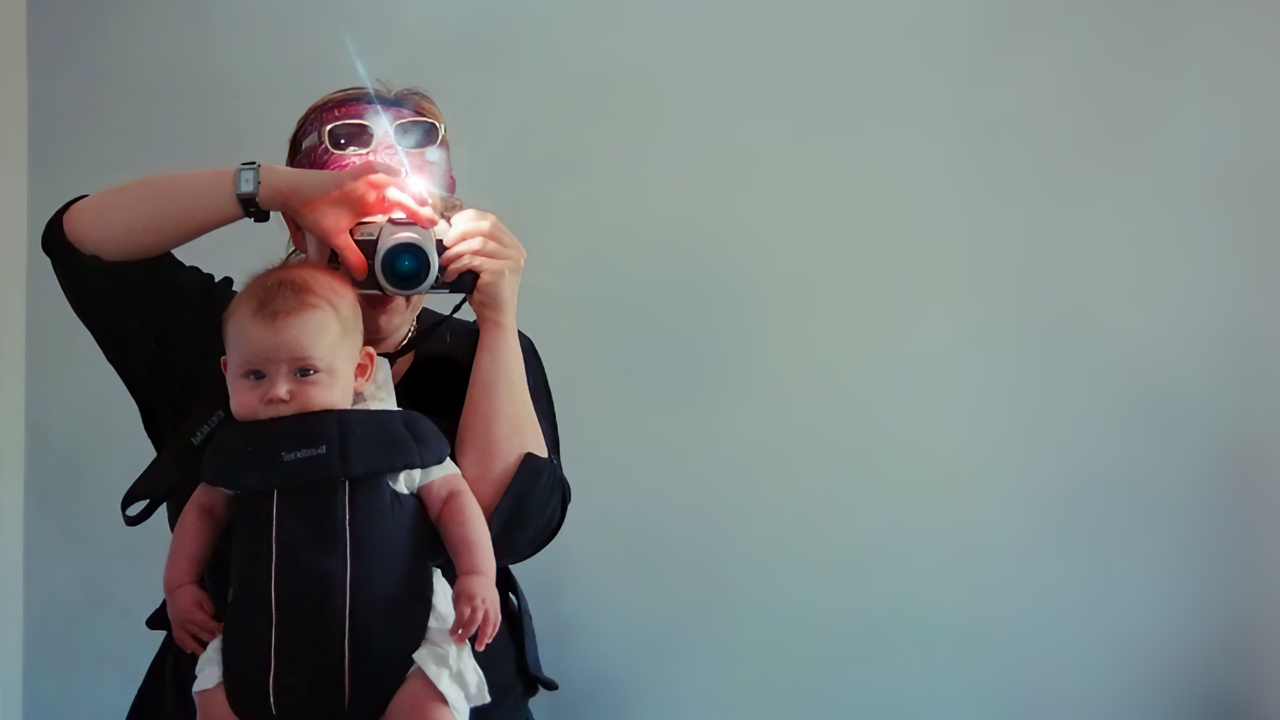Motherboard (2024) ‘CPH: DOX’ Review: Victoria, age 38, abandons her ambition to film the world, picks up the single motherhood call, takes a normative job, and clicks on the record with her camera facing herself. Victoria, age 58, wraps up her filming, packs it up in 91’, and sends it back to the world. You’re probably wondering what’s unique about this story and why it’s worth watching and reading about it.
In all fairness, self-documenting is such an established practice that (dare me) it can hardly excite or trigger any new constellations of feelings in the general audience. Without pointing out directions to the wider world of arts, when it comes to cinema, Chantal Akerman, Agnès Varda, and Jonas Mekas have famously provided us with similar oeuvres of a diaristic nature. Such examples have been of expansive value to cinema, from bending genres to empowering moving images by inviting viewers to reflect upon societal aspects of their lives and personal experiences.
When it comes to theories, Jean-François Lyotard asserted this phenomenon concretively (to my modest understanding), with graceful indications of how autoethnography can reveal tools to navigate the dissolution of metanarratives and to regain our position and agency over our perplexed individuality. Perhaps this discussion belongs to the 1980s, long before technological advancement and social media platforms allowed us (or entrapped us, depending on where you’re coming from) the possibility of constantly looking back at ourselves, with curatorial means far more direct and dynamic (and definitely questionable) than the editing tools and storytelling skills filmmakers can claim.
Nevertheless, what a strong act it is when an author decides to turn the camera to themselves in ordinary moments, moments where there’s no direction or performance, simply because they are possible moments of subjection to an emotional or demanding reality. What a strong act to raise one’s vulnerability (and the right to one’s privacy) to the big screen and a viewer’s eyes.
These thoughts followed me along as I watched how the British director Victoria Mapplebeck in “Motherboard” conceived her journey into raising her child without a paternal figure (and all the implications one can imagine such a situation entails). Words slip away when I try to imagine how these 20 years went for Victoria and her son, Jim, when the camera was not rolling. I underline this as a disclaimer to avoid any connections with how-to-single-parenthood stories. Audiovisual recordings should not be perceived as pure factual documentation and, therefore, cannot function as a guide, in this case, to prospective single mothers. Sure, they are a sort of support and consolation in the emotional, perhaps moral, extensions of such a decision. But I have reasons to believe that this film was not intended as such.

The film’s backbone is a handful of norms around family building, which are still widely controlled by a male-driven society. The debate over abortion is never explicitly touched. Not because it is irrelevant but because Victoria did want to raise a child. By doing so, she was faced with the predicament of pursuing the rest of her desires, whether career or dating-related and the implicit sense of guilt associated with such thoughts. While it is not the leading point, ‘Motherboard’ is veiled with this dilemma of (single) motherhood. Thankfully, Victoria was generous in her words and tears about what women have to let go of. It may be a matter of orchestration of the audiovisual material, but these moments are hardly ever read as complaints, which gives a new outlook on the source of guilt.
It is quite important to mention that Victoria, as we see her in the film, is a particularly sensible and tolerant person, and she has been inspiring her son with similar tendencies as well. There is an adorable scene, among the many, that is indicative of the relationship these two built. Jim (a late teenager) stands next to his mother (while the camera is capturing them through a mirror) and kneels down to reach her height to serve the balance of the frame better.
He then moves around the house, keeping this new height. There’s something heartwarming and heartbreaking about this play; he not only sees his mom in a frame he is part of (as a teenager, this is admirable), but he mainly sees her vision in making a film. This gesture of trying to literally step in the shoes of the other out of recognition or compassion is one of a kind.
Victoria Mapplebeck has collaged her footage and edited the film with exceptional balance and virtuosity. Suggestive overlaps between image, sound, and graphical elements are only moderate additions that consistently follow the narrative instead of interruptive impulses. There is no excessive nostalgic pride (which is a prevalent attitude toward similar attempts – think, for example, of your own recordings from the past).
The sequences are stretchable in time, proposing a view of the events not in linear time as they happened but following a horizontal narrative, as if everything occurred and was contained in the same boiling pot. It is surprising to notice that this choice does not give a dramatized version of reality, nor a more emotional one, but rather an alternative to it. Indeed, it is a logical one that is also very pleasing to watch, mainly because it was successfully executed. Ok the humor found throughout the film and the charming temperament of the main characters also add to its success.
I must admit that Victoria spared the heavy experimentation and thus mastered the art of a self-recorded diary. This is a point probably of minor significance to many, but it is paramount when considering the usual provisional nature of films like this. While experimentation here is inevitably crucial, it is equally risky. Because of its popularity within filmmaking, especially when it comes to autoethnographic documentaries, experimentation often comes in excessive amounts that leave space only for monotonous, opaque readings. Victoria used it well, not in the form but in the narrative. Even if this means having people like me question the open notes at the end. (Spoiler: eventually, I understood. “Motherboard” is not conclusive, but equally to life, it is definitely danceable.)

![Lady Macbeth [2017]: Pugh is the Star of Victorian Tragedy](https://79468c92.delivery.rocketcdn.me/wp-content/uploads/2017/09/Lady-Macbeth-film-768x322.jpg)
![Colossal [2017] Sundance Film Festival Review – A Wild, Gendered Monster Movie About Power, Control, and Male Fragility](https://79468c92.delivery.rocketcdn.me/wp-content/uploads/2017/01/colossal-2-768x384.jpg)



